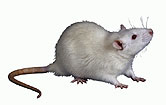- Could Artificial Sweeteners Be Aging the Brain Faster?
- Techniques for Soothing Your Nervous System
- Does the Water in Your House Smell Funny? Here’s Why
- Can a Daily Dose of Apple Cider Vinegar Actually Aid Weight Loss?
- 6 Health Beverages That Can Actually Spike Your Blood Sugar
- Treatment Options for Social Anxiety Disorder
- Understanding the Connection Between Anxiety and Depression
- How Daily Prunes Can Influence Cholesterol and Inflammation
- When to Take B12 for Better Absorption and Energy
- Epsom Salts: Health Benefits and Uses
Scientists Pinpoint Brain’s ‘Hunger Circuit’ in Mice


Working with mice, researchers have identified a group of brain cells involved in feelings of hunger, appetite and eating.
The researchers found that this group of brain cells — neurons — promotes fullness and removes uncomfortable feelings of hunger, even in mice that haven’t eaten. These findings, the researchers noted, could lead to the development of new weight-loss medications.
“One reason that dieting is so difficult is because of the unpleasant sensation arising from a persistent hunger drive,” said the study’s co-senior author, Dr. Bradford Lowell, an investigator at the Center for Nutrition and Metabolism at Beth Israel Deaconess Medical Center in Boston.
“Our results show that the artificial activation of this particular brain circuit is pleasurable and can reduce feeding in mice, essentially resulting in the same outcome as dieting but without the chronic feeling of hunger,” Lowell noted in a hospital news release.
Lowell’s lab colleagues and other scientists had previously found brain cells that recognize when calories are deficient and drive intense feeding. In the current study, the researchers continued their investigation by trying to identify the brain cells that actually trigger feelings of fullness.
They found a group of brain cells called MC4R-expressing neurons that appeared to be important in the regulation of appetite and weight.
The researchers tracked the activity of these MC4R cells in the brains of genetically engineered mice. They then observed the effects of MC4R changes in the feeding behavior of the mice.
Although the mice had eaten a day’s worth of calories and were not hungry, they ate ravenously when the MC4R cells were turned off. When these cells were activated, however, the opposite was true. The hungry, unfed mice didn’t eat. These brain cells essentially put a brake on eating and were able to prevent the mice from overeating.
“Turning on the [group of MC4R brain cells] had the same effect as dieting, but because it directly reduced hunger drive, it did not cause the gnawing feelings of discomfort that often come with dieting,” said Lowell.
Scientists note that research involving animals often fails to produce similar results in humans.
More information
The U.S. National Center for Complementary and Integrative Health provides more information on weight control.
Source: HealthDay
Copyright © 2026 HealthDay. All rights reserved.










